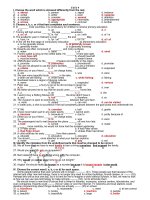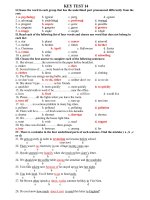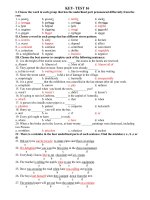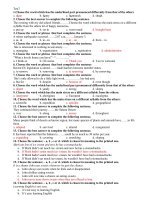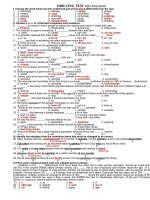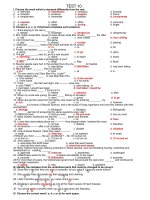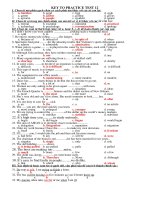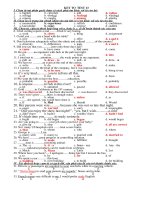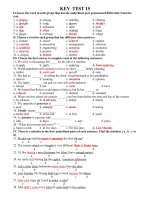Ôn thi TN- Test 16
Bạn đang xem bản rút gọn của tài liệu. Xem và tải ngay bản đầy đủ của tài liệu tại đây (101.66 KB, 6 trang )
Key- Test 16
I. Choose the word in each group that has the underlined part pronounced differently from the rest:
1. a. poetry b. grocery c. terrify d. sticky
2. a. teenage b. garbage c. carriage d. shortage
3. a. heat b. behind c. hole d. exhibit
4. a. creature b. cleaning c. sweat d. peaceful
5. a. groom b. blood c. typhoon d. spoon
II. Choose a word in each group that has different stress pattern:
6. a. sixteen b. sixty c. forest d. hectare
7. a. occur b. happen c. depend d. affect
8. a. continent b. continue c. contribute d. convenient
9. a. extinction b. musician c. ability d. vegetable
10. a. neighborhood b. regular c. bacteria d. negative
III. Choose the best answer to complete each of the following sentences:
11. it is the height of the tourist season now. _____ the rooms in the hotels are reserved.
a. Almost b. Almost of c. Most of all d. Almost all of
12. They opened the door at noon. Some people were already_______
a. in line to wait b. waiting in line c. line in waiting d. in line waiting
13. Since the storm came_______, it did a lot of damage in the village.
a. surprisingly b. doubtlessly c. hurriedly d. unexpectedly
14. it is a great _______that the exhibition was cancelled at the last minute after all your work.
a. complaint b. sorrow c. pity d. sadness
15. You were pleased when you heard the news,_________ you?
a. wasn’t b. weren’t c. didn’t d. haven’t
16. It’s going to rain in Canberra, ________ is the capital of Australia.
a. which b. where c. that d. when
17. A person who installs water pipes is a _______.
a. plumber b. patient c. carpenter d. locksmith
18. Hurry up _________ you will miss the bus.
a. and b. so c. if d. or
19. Every girl ought to learn ________to cook.
a. where b. what c. how d. when
20. When a fire broke out in the Louvre, at least twenty _______ paintings were destroyed, including two
Picasso.
a. worthless b. priceless c. valueless d. useless
IV. There is a mistake in the four underlined parts of each sentence. Find the mistakes ( a , b ,c or d)
21. Old car tyres can be recycle to make pipes and floor coverings.
a b c d
22. We delighted that you won the first prize in the chess tournament.
a b c d
23. Everybody I know like to eat chocolate and ice- cream.
a b c d
24. The teacher is telling the pupils what to use the new equipment.
a b c d
25. Dave was crossing the road when Jane was calling out to him.
a b c d
26. The boys hurt himself when they jumped down from the tree.
a b c d
27. The printed paper will get out from the output path on a minute.
a b c d
28. Would you mind if I closed the front door and open all the windows?
a b c d
29. Christmas songs were stories putting to music and most people enjoyed them.
a b c d
30. The man whose is sitting in that wheelchair fell off the ladder yesterday.
a b c d
V. Read the text below and decide which answer – a, b , c or d- best fits each space.
The tourist industry is considered to be the world’s largest industry. Before 1950 about 1 million
people ( 31)_____ abroad each year ( 32)_______by the 1990s the figure had ( 33)________ to over 400
million every year.
(34)______ large numbers of tourists, however, are beginning to cause problems. For example, in
the Alps the skiers are destroying the mountains ( 35)______ came to enjoy. Even parts of Mount Everest
in the Himalayas are reported to be covered ( 36)______ old tins, tens and food that have been
(37)_________away.
But at a time when we have greater freedom to travel ( 38)______ ever before, more and more
people are asking how they can enjoy their holiday ( 39)_______ causing problems by spoiling the
countryside.
Now there is a new holiday guide called Holidays That Don’t Cost the Earth. In ( 40)_______you
how can help the tourist industry by asking your travel agent or your tour operator the right questions
before you go on holiday.
31. a. traveled b. came c. sailed d. were
32. a. as b. because c. but d. when
33. a. gone b. flown c. risen d. raised
34. a. Such b. More c. Few d. So
35. a. which b. you c. who d. they
36. a. for b. on c. with d. below
37. a. put b. thrown c. given d. tidied
38. a. than b. when c. then d. while
39. a. outside b. instead c. beside d. without
40. a. says b. offers c. tells d. gives
VI. Read the following passage and choose the best completion for each sentence:
Isn’t it amazing how much time we spend talking about food? “have you ever eaten…..?” “What
did you have for lunch ?” and so on. And yet when you travel from one country to another, you find that
people have quite different feelings about food. People often feel that what they eat is normal, and that
what other eat is strange or silly. In most parts of Asia, for example, no meal is complete without rice. In
England, people eat potatoes everyday. In the Middle East, bread is the main part of every meal. Eating,
like so many things we do, become a habit which is difficult to change. Americans like to drink a lot of
orange juice and coffee. The English drink tea four or five times everyday. Australian drink large amount
of beer, and the French drink wine everyday.
The sort of meal people like to eat also differs from one country to another. Horse meat is thought
to be delicious in France. In Hong Kong, some people enjoy eating snake. New Zealanders eat sheep meat,
but they never eat goat meat. The Japanese don’t like to eat sheep meat because of its smell, but they enjoy
eating raw fish.
So it seems that although eating is a topic that we can talk about for hours, there is little common
sense in what we say about it. People everywhere enjoy eating what they have eaten, and there is very little
we can do to change our eating habits.
41. The writer thinks that______________
a. people eat only what is normal to everybody
b. people often change their feelings about food.
c. people have different opinions about food.
d. people like eating different foods as they travel from one country to another.
42. In many Asian countries, __________________
a. people almost always have rice in their meal. b. rice is a prefer food.
c. rice is included in every menu d. rice is completely eaten
43. The text is mainly about______________________
a. people’s different attitudes to food. b. the importance of meat
c. strange dishes in the world d. food and life
44. The Japanese enjoy eating raw fish because___________________
a. it doesn’t smell b. it is special to them c. it is well boiled d. it is not good to have fish cooked
45. people everywhere think that______________
a. we can spend few hours talking about food.
b. there is very little common sense in talking about food.
c. there is very little common sense in what we say about the eating habits
d. we should do much to change our eating habits.
VII. Choose one sentence that has different meaning to the root one.
46. My friends are good at drawing. I am good at drawing .
a. My friends are good at drawing, and I am too.
b. Both my friends and I are good at drawing.
c. my friends are good at drawing and so am I.
d. Neither my friends nor I am good at drawing.
47. The water was very cold, so we couldn’t swim.
a. We couldn’t swim because the water was very cold.
b. The water was too cold for us to swim
c. The water was very cold but we still went swimming
d. The water was very cold; therefore, we couldn’t swim.
48. The tidal wave swept away the village.
a. The village disappeared after the tidal wave.
b. The village was swept after the tidal wave.
c. The village was swept away by the tidal wave
d. The village was destroyed completely by the tidal wave.
49. The Chinese bicycle is $ 100. The Japanese one is $250.
a. The Chinese bicycle is cheaper than the Japanese one.
b. The Japanese bicycle is more expensive than the Chinese one.
c. The Japanese bicycle costs more than the Chinese one.
d. The Chinese bicycle has the same price as the Japanese one.
50. Tom must be having a bath.
a. Tom has got to have a bath. b. There is no doubt Tom is having a shower.
c. I am sure Tom is having a shower. D. It’s certain Tom is having a bath.
-The end-
Test 16
I. Choose the word in each group that has the underlined part pronounced differently from the rest:
1. a. poetry b. grocery c. terrify d. sticky
2. a. teenage b. garbage c. carriage d. shortage
3. a. heat b. behind c. hole d. exhibit
4. a. creature b. cleaning c. sweat d. peaceful
5. a. groom b. blood c. typhoon d. spoon
II. Choose a word in each group that has different stress pattern:
6. a. sixteen b. sixty c. forest d. hectare
7. a. occur b. happen c. depend d. affect
8. a. continent b. continue c. contribute d. convenient
9. a. extinction b. musician c. ability d. vegetable
10. a. neighborhood b. regular c. bacteria d. negative
III. Choose the best answer to complete each of the following sentences:
11. it is the height of the tourist season now. _____ the rooms in the hotels are reserved.
a. Almost b. Almost of c. Most of all d. Almost all of
12. They opened the door at noon. Some people were already_______
a. in line to wait b. waiting in line c. line in waiting d. in line waiting
13. Since the storm came_______, it did a lot of damage in the village.
a. surprisingly b. doubtlessly c. hurriedly d. unexpectedly
14. it is a great _______that the exhibition was cancelled at the last minute after all your work.
a. complaint b. sorrow c. pity d. sadness
15. You were pleased when you heard the news,_________ you?
a. wasn’t b. weren’t c. didn’t d. haven’t
16. It’s going to rain in Canberra, ________ is the capital of Australia.
a. which b. where c. that d. when
17. A person who installs water pipes is a _______.
a. plumber b. patient c. carpenter d. locksmith
18. Hurry up _________ you will miss the bus.
a. and b. so c. if d. or
19. Every girl ought to learn ________to cook.
a. where b. what c. how d. when
20. When a fire broke out in the Louvre, at least twenty _______ paintings were destroyed, including two
Picasso.
a. worthless b. priceless c. valueless d. useless
IV. There is a mistake in the four underlined parts of each sentence. Find the mistakes ( a , b ,c or d)
21. Old car tyres can be recycle to make pipes and floor coverings.
a b c d
22. We delighted that you won the first prize in the chess tournament.
a b c d
23. Everybody I know like to eat chocolate and ice- cream.
a b c d
24. The teacher is telling the pupils what to use the new equipment.
a b c d
25. Dave was crossing the road when Jane was calling out to him.
a b c d
26. The boys hurt himself when they jumped down from the tree.
a b c d
27. The printed paper will get out from the output path on a minute.
a b c d
28. Would you mind if I closed the front door and open all the windows?
a b c d
29. Christmas songs were stories putting to music and most people enjoyed them.
a b c d
30. The man whose is sitting in that wheelchair fell off the ladder yesterday.
a b c d
V. Read the text below and decide which answer – a, b , c or d- best fits each space.
The tourist industry is considered to be the world’s largest industry. Before 1950 about 1 million
people ( 31)_____ abroad each year ( 32)_______by the 1990s the figure had ( 33)________ to over 400
million every year.
(34)______ large numbers of tourists, however, are beginning to cause problems. For example, in
the Alps the skiers are destroying the mountains ( 35)______ came to enjoy. Even parts of Mount Everest
in the Himalayas are reported to be covered ( 36)______ old tins, tens and food that have been
(37)_________away.
But at a time when we have greater freedom to travel ( 38)______ ever before, more and more
people are asking how they can enjoy their holiday ( 39)_______ causing problems by spoiling the
countryside.
Now there is a new holiday guide called Holidays That Don’t Cost the Earth. In ( 40)_______you
how can help the tourist industry by asking your travel agent or your tour operator the right questions
before you go on holiday.
31. a. traveled b. came c. sailed d. were
32. a. as b. because c. but d. when
33. a. gone b. flown c. risen d. raised
34. a. Such b. More c. Few d. So
35. a. which b. you c. who d. they
36. a. for b. on c. with d. below
37. a. put b. thrown c.given d. tidied
38. a. than b. when c. then d. while
39. a. outside b. instead c. beside d. without
40. a. says b. offers c. tells d. gives
VI. Read the following passage and choose the best completion for each sentence:
Isn’t it amazing how much time we spend talking about food? “have you ever eaten…..?” “What
did you have for lunch ?” and so on. And yet when you travel from one country to another, you find that
people have quite different feelings about food. People often feel that what they eat is normal, and that
what other eat is strange or silly. In most parts of Asia, for example, no meal is complete without rice. In
England, people eat potatoes everyday. In the Middle East, bread is the main part of every meal. Eating,
like so many things we do, become a habit which is difficult to change. Americans like to drink a lot of
orange juice and coffee. The English drink tea four or five times everyday. Australian drink large amount
of beer, and the French drink wine everyday.
The sort of meal people like to eat also differs from one country to another. Horse meat is thought
to be delicious in France. In Hong Kong, some people enjoy eating snake. New Zealanders eat sheep meat,
but they never eat goat meat. The Japanese don’t like to eat sheep meat because of its smell, but they enjoy
eating raw fish.
So it seems that although eating is a topic that we can talk about for hours, there is little common
sense in what we say about it. People everywhere enjoy eating what they have eaten, and there is very little
we can do to change our eating habits.
41. The writer thinks that______________
a. people eat only what is normal to everybody
b. people often change their feelings about food.
c. people have different opinions about food.
d. people like eating different foods as they travel from one country to another.
42. In many Asian countries, __________________
a. people almost always have rice in their meal. b. rice is a prefer food.
c. rice is included in every menu d. rice is completely eaten
43. The text is mainly about______________________
a. people’s different attitudes to food. b. the importance of meat
